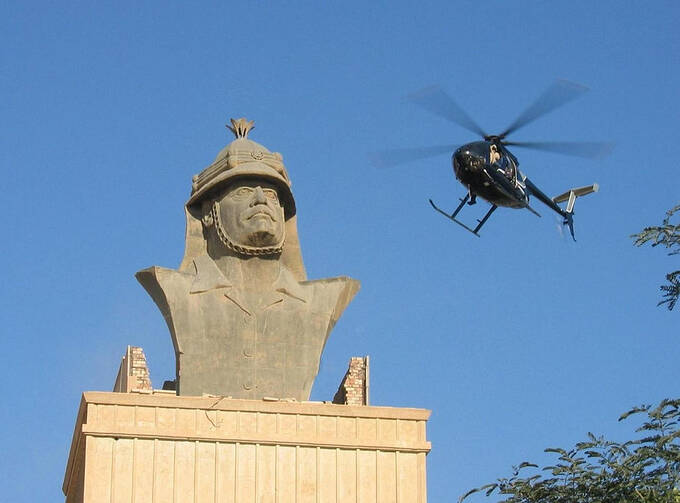Lessons From Nisour Square
Many Iraqis had come to doubt that anyone would ever be held accountable for a senseless slaughter in Baghdad in September 2007. Fourteen unarmed Iraqis were killed when private military contractors went on a rampage at a traffic circle in Nisour Square. It has taken more than seven years, but three men were convicted on Oct. 22 of manslaughter and a fourth of murder. The men had been employees of Blackwater Worldwide, a well-paid and well-connected private security force hired to ride shotgun for U.S. diplomats. (The firm rebranded as Academi in 2011, its second name change since the notorious incident.) The verdict will no doubt be chased by appeals; nevertheless, it a strong signal that the era of impunity for U.S. military contractors is over.
The decision offers an opportunity to revisit the privatization of responsibilities previously reserved for U.S. military and intelligence forces—a trend that accelerated after the invasion of Iraq in 2003. Since then, hired guns have at times proved costly embarrassments for both the Pentagon and the intelligence community, yet the role of private contractors remains prominent. A report from the Congressional Research Service in May 2013 found that there were nearly 18,000 security contractors in Afghanistan, compared with 65,700 U.S. troops. Over the last six years, the defense department doled out $160 billion to private contractors (most of which are not involved in security operations), a figure that “exceeded total contract obligations of any other U.S. federal agency.” A major finding of the same report was that the Pentagon was not up to the job of supervising its casual-wear military.
A dangerous dependency on private security has evolved. Until adequate oversight and compliance with international norms can be assured, the Pentagon should be seeking to reverse this trend and cease the outsourcing of defense.
The Catholic Press Shines
This year two American Catholic publications celebrated their anniversaries following long, faithful service to the church. Both are mostly lay-run operations, although Commonweal has had two non-lay editors and The National Catholic Reporter has priests and women religious on their board and staff. N.C.R. enjoyed its 50th anniversary in the Kansas City Visitation parish hall. Commonweal celebrated, at Chelsea Piers in Manhattan, its 90th year by honoring former Senator George Mitchell with its Catholic in the Public Square Award.
Founded shortly after World War I, Commonweal’s guiding principle was that democracy and Catholicism must be partners, not antagonists. Early contributors included G. K. Chesterton and Jacques Maritain. In 1967 it called for an escalation of civil disobedience to oppose the Vietnam War. That same year N.C.R.’s founding editor, Robert Hoyt, wrote that the “mid-sixties offered the best opportunity in history to bring the traditions and professional techniques of secular journalism fully into the service of the church.” With the future editor Thomas Fox working as their correspondent in Vietnam, N.C.R. relentlessly covered the war, opposing it on moral grounds.
Addressing the anniversary dinner, Mr. Fox said, “Good journalism gives voice to the voiceless.” Today that characterizes not only Commonweal and N.C.R. but America and other Catholic publications that reach out to today’s young journalists, inviting them to raise their voices too for faith and justice.
Catholicism in Mongolia
That Catholicism is universal is borne out in the unlikeliest of places. One of them is Mongolia, where Catholics have a tiny but growing presence. As Buddhism has historically been (and still is) the predominant religion in the landlocked Asian country, it may be news to some that there are Catholics there at all. But since the demise of Communism in the 1990s Catholic missionaries have been planting the seeds of faith in this nomadic land.
Thanks to Vietnamese and Filipino missionaries, Catholicism has been gaining converts ever since a post-Communist democratic government signaled that church ministries would be welcomed to help combat the alcoholism, domestic abuse and pervasive poverty that plague the country. Within three years, people began to join the Catholic Church at the rate of 20 to 50 per year; the Catholic population now stands at about 850. In 2003, in recognition of this achievement, a Filipino missionary, Wenceslao Padilla, was named the country’s first bishop.
Catholicism in Mongolia has also seen challenges. Restrictions on religious education and practice prompted the Rev. Kuafa Hervé, a 36-year-old priest of the Cathedral of Saint Peter and Paul in Ulan Bator, to describe the Mongolian church as “beleaguered.”Despite the obstacles, Catholicism holds on in Mongolia. The members of the Gantulga family, for example, converted in the hope of living better lives. Their faith can be summed up in a simple song Mr. Gantulga composed for the church’s 20th anniversary in 2012: “Jesus Christ has saved us.”








